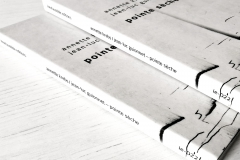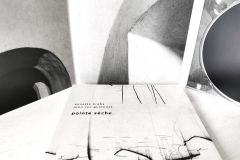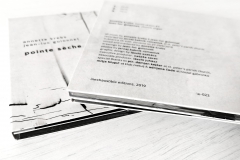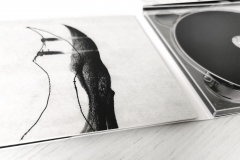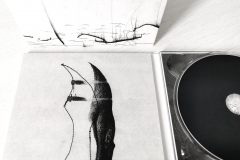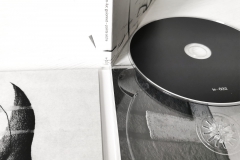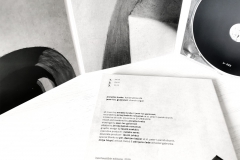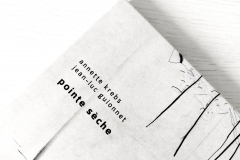Annette Krebs / Jean-Luc Guionnet – Pointe Sèche
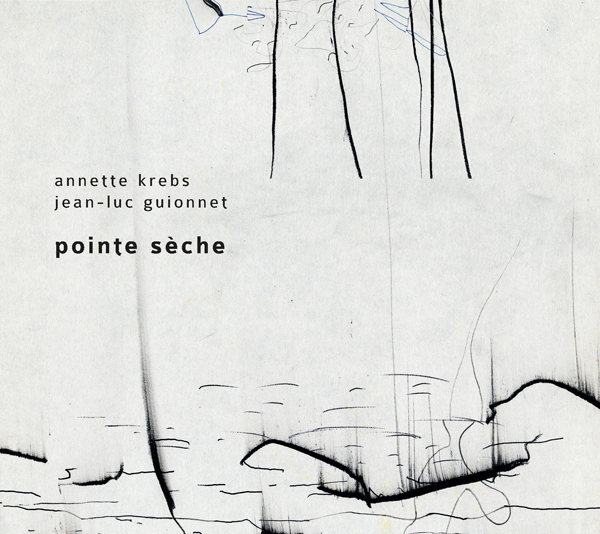
1. (26:23)
2. (24:13)
3. (19:17)
· Annette Krebs: Konstruktion #4
· Jean-Luc Guionnet: church organ
All music by Annette Krebs & Jean-Luc Guionnet
Recorded by Jernej Babnik Romaniuk at St. Peter’s Parish Church in Bistrica ob Sotli, Slovenia on 27-29/6/2018
Mixed and mastered by Annette Krebs
Drawings by Jean-Luc Guionnet
Photos by Jernej Babnik Romaniuk
Graphic design by László Szakács
Executive producer: Nataša Serec
Associate producer: László Juhász
Special thanks to Ptr. Damjan Kejžar at St. Peter’s Parish Church, Mitja Hlupič at Klub Metulj & Adrijana Čede at Hostel Gabronka
Released: December 2019 / first edition of 300 cds
Direct purchase: Bandcamp / Discogs
GALLERY ↓
REVIEWS ↓
“Another duet, but this time in the realm of improvised music, is by Jean-Luc Guionnet on the church organ and Annette Krebs on ‘Konstruktion #4’. Krebs creates her instruments and gives them numbers; #4 is a combination of objects from the previous three and includes pieces of metal, strings, objects, microphones, tablets and sensors. Find her on YouTube playing her instruments and you’ll get the idea. Recordings the two of them made in a church in Slovenia over two days in June 2018 are to be found in three lengthy pieces on this CD. While no-one has much idea of how Krebs ‘Konstruktion #4’ sounds like, the sound of a church organ is well-known, I should think. That makes it all the more difficult to figure out who does what here. There were moments in which I heard nothing else but a church organ, with Guionnet opening various registers and adding bass tones; there were some moments in which I didn’t hear him, but Krebs more electro-acoustic approach, but what about all these moments in which I thought I heard something that could be either Guionnet or Krebs? Or perhaps (surely, even) it was the two of them together. And what about the use of voices? Where did those come from? The music changes quite a lot; this isn’t one of those cases in which a few organ tones are held for a long time, but all the possibilities of both instruments, and in a wide range of volume changes. Sometimes as quiet as a church mouse (sorry, couldn’t help that) and sometimes filling up the whole space. There is a great interaction between these two players and there is also a fine dialogue with the space they use; sometimes it seems they use all of this and sometimes they just by-pass it, or so it seems.” / Frans de Waard, Vital Weekly, 1 September 2020
“Three excellent, recent-ish releases from Inexhaustible Editions made there way to my abode last week. Annette Krebs / Jean-Luc Guionnet – Point Sèche. A spacious, imaginative duo from 2018 with Krebs at her Konstruktion #4 (an amalgamation of various items) and Guionnet on church organ. The latter used in extreme fashion, but not loudly or garishly, rather with subtle, smoky attenuations weaving among the welter of sounds generated by Krebs, very enveloping – some of my favorite work from either musicians in a while. Gerard Lebik / Noid – Psephite. A wide-ranging 2013 date with Lebik on sound objects and Noid on cello. Either player moving through steady-state forms, traditional playing and rambunctious, sharp-angled work. Disorienting and absorbing; good work, always surprising. Antoine Beuger – Dedekind Duos. Performed by Carl Ludwig Hübsch (on tuba) and Pierre-Yves Martel (on viola da gamba). A fuller-sounding piece than much of Antoine’s work, this pair also takes things more aggressively than typically heard in a Wandelweiser performance, the tuba robust and deep, the viola da gamba forthrightly grainy and richly complex. Interesting to hear this approach and I find the result intriguing and often exciting. All three well worth hearing.” / Brian Olewnick, Facebook, 5 September 2020
“Dans un label comme Inexhaustible Editions dont le titre évoque un album incontournable d’AMM (The Inexhaustible Document), il faut s’attendre à des choses parfois extrêmes ou plus conceptuelles. Pointe sèche se réfère sans doute aux dessins de Jean-Luc Guionnet qui ornent la pochette. Cet artiste est crédité « church organ » et sa collègue Annette Krebs « Konstruktion #4 ». J’ai très peu de prétentions musicologiques « contemporaines » per se et j’aurais aimé trouver dans la pochette une clé pour comprendre ce qu’est « Konstruktion #4 » , un instrument, une installation, une composition pré-enregistrée… J’ai trouvé une réponse sur son site. La musique fut enregistrée en juin 2018 à l’église St Pierre à Bistrica Ob Sotli en Slovénie. Connu pour son travail de saxophoniste dans les cercles de l’avant-garde de l’improvisation internationale, Jean-Luc Guionnet pratique avec succès l’orgue d’église en explorant et requérant les uniques possibilités de souffle, de sifflement des tuyaux d’orgue avec des pressions des touches qui laissent flotter les vibrations minimums, voire minimales des colonnes d’air produisant des sonorités hantées, désincarnées, dans des drones vacillants et fantômatiques, glissandi et agrégats de timbres défiant la notion de texture. Un travail minutieux sur quelques paramètres savamment sélectionnés et déformés jusqu’au mystère. Pentes paru chez à bruit secret il y a bien longtemps est d’ailleurs un opus révélateur. Sa collègue qui fut un temps guitariste dans la scène réductionniste berlinoise (Burkhard Beins, Andrea Neumann, Axel Dörner) projette dans l’espace de brefs collages de voix ou de percussions qui oblitèrent les soufflement diserts ou font sursauter l’organiste. Trois pièces 1., 2., 3. respectivement 26, 24 et 19 minutes. Je vous fait grâce des secondes. Au fil des morceaux, la tension monte et les intentions musicales se dévoilent à petites doses. Le discours se corse et l’écoute s’anime. Je suis particulièrement friand d’orgue à vents et à tuyaux traités de cette manière et je ne pourrai m’empêcher de me plonger à plusieurs reprises dans leur univers pour jouir de la fascination de clusters mouvants, glissants, s’échappant dans l’espace et le silence. Des surprises… Une vocalité inespérée (diphtongues nordiques, sibériennes ou magyar) qui s’installe sans peine dans une acoustique difficile. L’acoustique des églises sont souvent très dures en raison du sol en dalles de pierre ou de marbres, des murs réverbérant et des fréquences malaisées générées par la disposition du bâti. J’espère que d’autres aient la même idée : écouter soigneusement ce disque. La musique improvisée ou expérimentale est un chantier permanent et cette musique exprime cela au mieux. Un très bel ouvrage aussi mystérieux que réussi.” / Jean-Michel Van Schouwburg, Orynx-improv’andsounds, 14 September 2020
“Annette Krebs and Jean-Luc Guionnet recorded the three long, numbered tracks on Pointe Sèche (translation: Dry Point) over the course of three days at St. Peter’s Parish church in Bistrica ob Sotli, Slovenia. Location matters because this music couldn’t happen just anywhere; Guionnet plays church organ. Krebs was once part of the post-Keith Rowe generation of tabletop guitarists, but since 2014 she has abandoned strings and fretboards in favor of a series of hybrid instruments called konstruktions. Konstruktion #4, which appears on this record, includes suspended pieces of metal, a handful of toy animals, a wooden sounding board, vocal and contact microphones and a couple touch screens that manage computer programs. While both musicians have extensive backgrounds in improvisation, this recording sounds more like an audio transcription of a multi-media collage. Guionnet plays his large instrument quite softly, extracting machine-like hums, brief burps and dopplering tones that flicker around the periphery of Krebs’ fragments of speech, distant clangs and unidentifiable events. The resulting sounds resolutely defy decoding, which is its own reward in a time when so much music can be reduced to easily identifiable antecedents.” / Bill Meyer, Dusted Magazine, 18 December 2020
“On Pointe Sèche, we have the excellent Jean-Luc Guionnet on the church organ, along with Annette Krebs who is credited with playing ‘Konstruktion #4’. The organ was in St. Peter’s Parish Church in Bistrica ob Sotli, Slovenia. I’ve got a lot of time for Guionnet generally, especially with his recent large-scale pieces which have attempted to investigate architectural space in various ways, with sets of players distributed strategically around unusual performance spaces, but I’ve also keenly followed his work on the church organ. He has made it into something all his own. I was very struck by his idea that he sees the instrument as something that has all the possibilities of a mixing desk. I’m unsurprised to learn that he’s been playing historic organs in churches all around the world for the last 20 years.
As to Annette, her Konstruktion #4 is the latest version in a string of devices she’s been working on ever since she first elected to take her guitar to pieces; it’s pretty much an assemblage made of ‘highly amplified metal pieces, strings, objects, and microphones’, and while that may sound not too far apart from Keith Rowe’s tabletop guitar, or something similar which Fred Frith may have built, I am certain that Krebs has evolved and built something totally unique and that fits her way of playing exactly. These 2018 recordings are extremely long in form, with three pieces occupying well over an hour of listening time; accordingly the work unfolds in a very cryptical and gradual manner, with strange and subdued tones creeping out the shadows and shapes revealing themselves. I admire the high-minded ambitions of both these musicians: Krebs had to build her own instruments in order to do things that could not otherwise be done, using conventional means; while Guionnet goes even further, seeing all of his music as a means of ‘testing reality’. It’s as though every note he plays is asking a probing question about the environment around him.
All of these elements may account for the very odd and darkly intriguing mood of this excellent album. Decorated with drawings Guionnet; the title translates as “drypoint”, which is a technical term used in engraving and etching, but may mean something completely different in this context.” / Ed Pinsent, The Sound Projector, 2 March 2021
RADIO PLAYS ↓
· Godbeni Imperializem at Radio Študent, Ljubljana, 2 June 2020
· No Wave at Tilos Rádió, Budapest, 23 August 2020
· The Sound Projector Radio Show at Resonance FM, London, 13 November 2020

